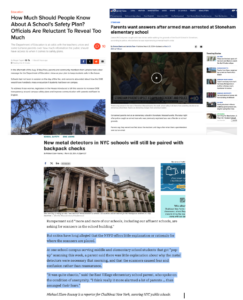“I don’t know what to say, how to say it, and when to say it.”
Those were the words of a school principal at the beginning of my doctoral program at Johns Hopkins. The topic with which he was struggling: Speaking with parents about school safety.
This school administrator was not alone in his struggle with communicating school safety. My research aligned with my three decades of experience in school safety showing many school administrators experience similar communication struggles.

Three different states. Three different school districts. Three different circumstances. Same issue: How much information should school leaders release about school safety plans and school security incidents, and how do they effectively do it?
Three stories from the past week illustrate school leader safety communications challenges:
In Hawaii, parents and community members want education department officials to show them specific school safety plans. (Read more here)
In Massachusetts, parents were angry with school leaders after a delayed message from the superintendent about a man experiencing a mental health crisis who was caught on elementary school grounds with two knives. (Read more here)
In New York City, parents were critical of why weapons detection systems were randomly at one middle and elementary school, saying it was unclear why they were there, it was chaotic, and the scanners “…caused fear and confusion rather than reassurance,” according to the story. (Read more here)
As I noted in my interview for the Hawaii story, most states and districts do not publicize the details of school emergency plans. But I also understand parents’ concerns and desires to know that their principals and other school staff are prepared.
School administrators need to be strategic school safety leaders AND strategic communicators about safety
Parents expect school administrators to be transparent and authentic school safety leaders. Communications about school safety should be proactive, not just reactive.
Superintendents, principals, school board members, and other school leaders should be talking with parents, staff, and students about school safety, security, and emergency preparedness far before a serious safety issue or incident arises. These communications should be ongoing, not just a “one and done” mention.
I put together several articles over the years to help support school administrators in being better strategic school safety leaders and communicators:
Strategic School Safety Leaders-ASBJ Dec 2023
Crisis Communications in a Digital World
The Post-Crisis Crisis: Managing parent and media communications
Communicating Safety to parents and the media
But our school administrators deserve more support than several articles alone. They need professional learning opportunities — training. Too often, if provided any training at all, it may be one hour at a professional conference. They deserve more. The stakes are too high.
We remind school leaders that they can do a textbook job at handling a school safety incident, but if they screw up the communication about it, they are at high risk of losing the confidence of members of their school community.
Avoiding the communications and confidence crisis is worth the training time.
Are your school leaders supported to be stronger school safety leaders and communicators?
Dr. Kenneth S. Trump is President of National School Safety and Security Services
National School Safety and Security Services
Experts You Can Trust!
Connect with Dr. Ken on Linkedin: www.linkedin.com/in/kentrump/
Follow Dr. Ken on Twitter @safeschools
Visit and “Like” Our Facebook School Safety News Channel at: www.facebook.com/schoolsafety
Visit School Security Blog at: www.schoolsecurity.org/blog

